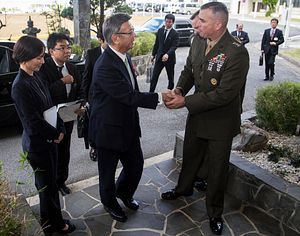Okinawa Governor Takeshi Onaga assumed office last December after promising to oppose the relocation of a U.S. Marine Corps base within Okinawa, but he’s had little luck getting the government in Tokyo to reconsider the project. So this week Onaga is in the United States, hoping to present his case to U.S. officials directly.
As The Diplomat has reported previously, Onaga has tried to halt construction work on the new Marine air base in the Henoko district. He threatened to revoke prefectural approval for the construction project, citing environmental concerns, even saying he would take the central government to court if necessary. Onaga argues that the burden of hosting U.S. troops should be more evenly distributed throughout Japan, rather than centered on Okinawa.
The central government has so far ignored his protests – as well as the literal protests by Okinawans who also want the construction work stopped. When U.S. Secretary of Defense Ashton Carter visited Tokyo in April, Japanese Defense Minister Gen Nakatani and Foreign Minister Fumio Kishida assured him that the relocation of the current Futenma Air Station to Henoko would proceed.
Onaga, however, is still hoping he can change the plan. He arrived in Washington, D.C. on Monday for a series of meetings with U.S. officials, including U.S. senators as well as officials from the Departments of State and Defense.
Onaga doesn’t seem to be making much headway. He held a meeting with Senator John McCain (R-AZ), the chairman of the Senate Armed Services Committee on Tuesday. In a statement, McCain spoke of “appreciation for the people of Okinawa” and expressed “continued willingness to engage in constructive dialogue with the governor.” But McCain was also clear about his “ongoing support for the current plan to relocate U.S. Marines on Okinawa.”
Onaga’s joint meeting with Joseph Young, director of the Office of Japanese Affairs at the State Department, and Cara Abercrombie, acting deputy assistant secretary of defense, didn’t go much better. Like McCain, both officials “expressed sincere appreciation to Okinawa for its vital contributions to the U.S.-Japan Alliance,” according to a State Department statement. But they also “underscored that the governments of the United States and Japan share an unwavering commitment to the construction of the Futenma Replacement Facility (FRF), the airfield at Camp Schwab.” Young and Abercrombie told Onaga that “the United States’ troop presence in Okinawa is fundamental to our treaty commitment to the defense of Japan.”
Other members of Onaga’s group – there were around 20 officials from Okinawa traveling with him, according to Asahi Shimbun – met with U.S. representatives and think-tank researchers. Sueko Yamauchi, a member of Okinawa’s prefectural assembly, told Asahi Shimbun the response has been mixed: “There are two extremes, with some persistently fighting our opposition to relocating the base to Henoko and others deeply moved by our side of the story.” Despite the uphill battle, he said, the prefectural government remains committed to “conveying the reality of Okinawa and spreading the thoughts of Okinawans, even if it’s just by a little.”
But with both Japan’s central government and the United States saying there’s no viable alternative to the base relocation plan, Onaga’s options moving forward are limited. After all, in 2008 Democratic Party of Japan Prime Minister Yukio Hatoyama pledged to move the base off of Okinawa – and resigned just eight months after winning office, in part because it became apparent that promise was politically impossible to keep.

































